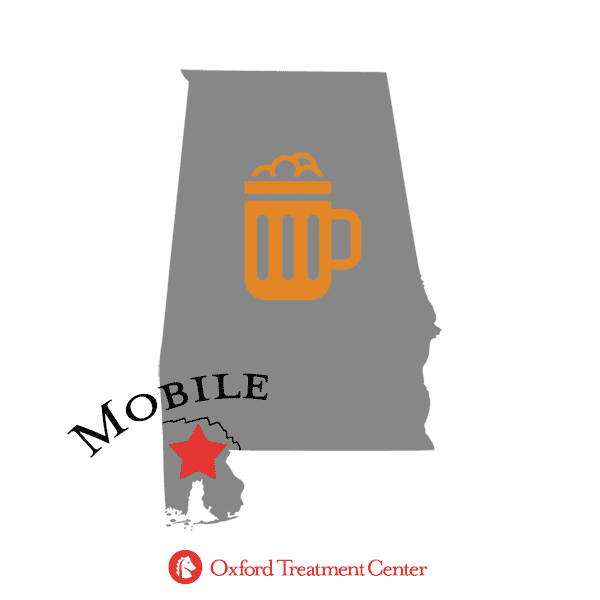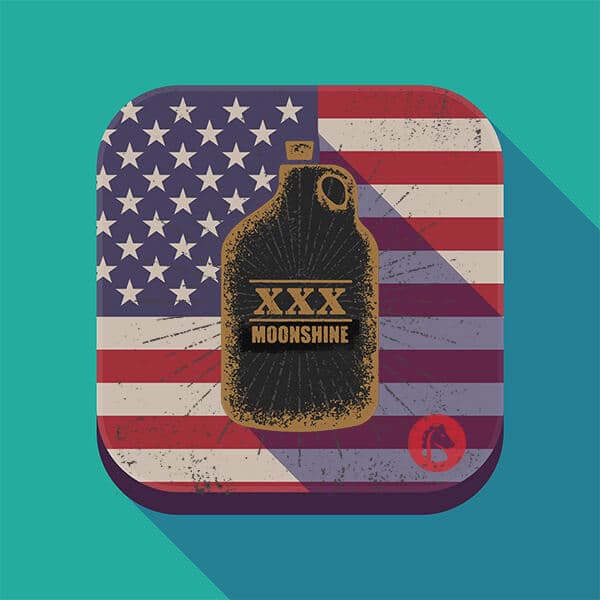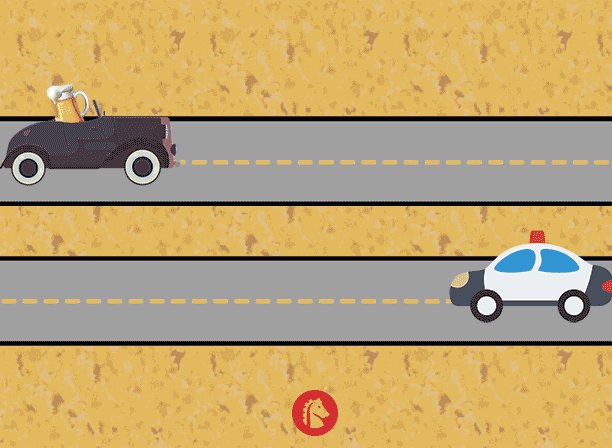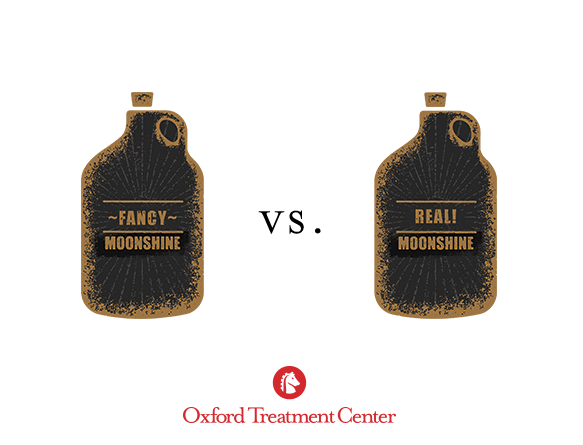History of Moonshine and Prohibition in the United States South
Resisting Prohibition & 18th Amendment
From the moment it went into effect, the 18th Amendment was unpopular. It crippled the service industry, empowered criminals, and made it almost impossible for private citizens to enjoy alcohol in the privacy of their own homes. However, it did remain possible; so reviled was Prohibition among the now-gutted alcohol industry that even though breweries were legally required to produce so-called “near beer” (beer with less than 0.5 percent alcohol by volume, what would be called “non-alcoholic beer” today), they did what they could to resist. A few breweries started to create malt extract, sweeteners derived from starch or grain. They marketed the extract as a cooking product and sold it with clear instructions on how to use the extract to make bread that was “light and perfectly browned.” This way of making beer was an open secret; everybody saw through it, including the federal government, which raided these renegade breweries and confiscated the malt. Nonetheless, a court order declared that since the malt extract was, indeed, a cooking product, its production and marketing as such could continue. This allowed people to buy the malt extract and all the “bread” they wanted in their own homes.
Other examples abound. Private citizens became registered pharmacists, exploiting another loophole in the law. Hardware stores openly sold the parts required for making a distillery, and libraries did not attempt to hide the books that served as instruction manuals. This gave rise to the practice of “bathtub gin,” home-based and amateur distilleries (sometimes literally in a bathtub) that people used to subvert the anti-drinking laws. Making alcohol at home was not a new phenomenon, but it assumed new importance when the government criminalized the production of liquor. Prohibition ultimately empowered Americans to become experts in the creation of the alcohol it was supposed to ban.
Breweries were not the only institutions to get in on the do-it-yourself market. Even churches made use of the exemptions that the 18th Amendment granted to religious institutions (for the use of wine during ceremonies). The grape industry that kept the churches supplied with kits of juice concentrate, complete with notices that if the concentrate was left for too long, fermentation would occur, which would turn the juice into wine. “Saved from Prohibition by holy wine,” writes the Smithsonian.
Open Rebellion
For many people in the South, Prohibition was an ugly reminder of the federal government once again throwing its weight around where it wasn’t welcome. The Civil War had come to a bloody (and ultimately humiliating) end only 55 years prior, and when the law came down that making, selling, and transporting alcohol was no longer allowed, it was a law that was at best ignored and outright rejected.
For example, Alabama’s legislature had passed its own Prohibition ruling as early as 1909, but the city of Mobile “was practically in open rebellion” against both the state and federal laws. The rebellion was initially peaceful, even law-abiding. In 1907, the mayor of the city (not ironically, a brewery owner) went to the state capitol to protest the burgeoning local prohibition measure. The president of the Bank of Mobile even promised that Mobile would secede from the state of Alabama if the anti-prohibitions were unsuccessful in their aims.
For a southern state like Alabama, Prohibition was always going to be a bad idea. The access to the Gulf of Mexico meant that big cities with ports (like Houston, New Orleans, Mobile, Tallahassee, and Tampa) became centers for smuggling and related crime. When local police (and then federal agents) attempted to enforce the law, corruption and violence soon followed. In time, the Mobile Register’s pages carried nothing but stories of arrests and shootouts, including the killing of two police officers and indictments against many eminent locals for bribery and bootlegging. A raid in 1923 led to $100,000 worth of alcohol being confiscated; the federal government had to rent “nearly every large truck in the city” to bring the contraband (scotch, cognac, and champagne) to the downtown Federal Building. The case made the headlines of The New York Times, leading the editorial board of the Mobile Register to lament how the local community had “been brought into an unhappy and unenviable notoriety before the nation.”
The Mecca of Moonshine
New Orleans has a similar history. A curator at the Southern Food and Beverage Museum told the Times-Picayune that being a big port city, New Orleans was already the site of whiskey and champagne imports coming from South America and the Caribbean. When Prohibition came into effect, business not only continued, it increased (albeit illegally), turning the city into a “giant warehouse liquor store.”
Louisiana’s marshy geography offered rum-runners perfect cover for their operations, gliding up the Mississippi River into New Orleans, and then using the city as a base to sell their illegal spirits across the South. The residents of the area benefitted from the federal government focusing its enforcement efforts on the Northeast; a 1926 government poll showed Detroit and New Orleans to be “the wettest cities in the US.”
In fact, the moonshiners who created whiskey in Opelousas and Leonville did such a good job, that word soon spread outside of Louisiana’s borders of the high-quality product. Leonville became known as “the mecca of moonshine,” with people driving in from neighboring Mississippi to do what they could to support the illegal alcohol industry.
Moonshine and American History
While rebelling against Prohibition became a national phenomenon, the South took the idea much more seriously, especially when it came to making their own alcohol. Mental Floss explains that moonshine is a cultural heritage among many Southerners, who look at it as an enduring tradition of sticking it to the federal government’s business of regulating alcohol production and consumption.
Moonshine existed long before Prohibition, and the argument can be made that without moonshine, even the legal and regulated practice of American whiskey production might never have taken form. In colonial Pennsylvania, whiskey was so important that it was used as currency, which caught the eye of the early federal government. In 1791, the government (led by President George Washington) established the “whiskey tax,” which covered all forms of liquor made in the country, as a way of recouping the financial losses of fighting the British Empire for independence. Distillers (some of whom fought in the Revolutionary War) resented the idea of having to share a cut of their profits with the authorities, and resisted tax collectors (sometimes resorting to violence and intimidation).
The stalemate lasted for three years, with as many as 6,000 people banding together to hold off against the authorities. After the death of a local commander, George Washington himself intervened and asked the citizens to stand down. Unbeknownst to them, Washington had taken the step of asking local governors to form a militia to enforce the tax, if need be. What became known as the Whiskey Rebellion was ultimately unsuccessful – the Whiskey Tax was the law of the land for the next nine years – but it spoke to the lengths to which Americans would go to defend their alcohol practices from the reach of the government and the deep resentment they would feel toward the government for interfering in their way of life.
The History of Moonshine Runners and Nascar
For many in the South, Prohibition was an even more egregious case of the government trying to tell them what to do (going from simply demanding a tax on liquor profits to mandating that all alcohol-making activity cease). When the 18thAmendment went into effect, southerners either paid it nothing more than lip service or continued their whiskey-making operations in earnest (if in secrecy).
For example, mechanics adapted their vehicles to become faster and more maneuverable (to avoid police patrols) while further modifying their cars to conceal and transport as much illegal alcohol as possible. Drivers became experts at navigating tight turns (sometimes in treacherous terrain) while being pursued, so much so that they started to race each other for fun. It was from this pastime that competitive racing emerged, which gave birth to NASCAR. So important was moonshining to NASCAR that the founder of NASCAR received seed money from a former moonshiner, Raymond Parks, a man ESPN called “one of the greatest pioneers” in stock car racing upon his death. It was a good investment; today, NASCAR comes behind only the National Football League in terms of television viewers and fans in America. The Gainesville Times writes that stock car racing’s passionate following in the South (so intense that The Atlantic wondered if it would ever catch on outside of the region) is a direct result of how deeply ingrained moonshining was (and still is) to locals.
National Geographic blogs that moonshine “embodies a proud cultural heritage of toughness and rebelliousness,” and that belief endured long after President Franklin D. Roosevelt signed the 21st Amendment into law, repealing Prohibition. Even though the production, sale, and commercial consumption of alcohol was legal again, the people who had made a lifestyle of defying the 18th Amendment saw no reason to give up the fight against the federal government’s imposition into their way of life.
Moonshining Drama and Reality
For that reason, moonshine culture exists today, partly as a celebration of southern culture and partly as a still-active rejection of the role of government. It has even made its way to the airwaves, with the Discovery channel producing and broadcasting Moonshiners, a reality television series about the lives of a group of moonshiners operating in the Appalachian mountains. The series purports to depict “a fearless group of men and women […] defying the law to keep the centuries-old tradition of craft whiskey alive.” That description was contested by the Virginia Department of Alcoholic Beverage Control, who stated that the producers of Moonshiners deliberately misled the viewing public into believing that the cameras were actually capturing illegal whiskey manufacturing. A spokeswoman for the ABC told FOX News that “the show is a dramatization,” and at no point was any unlawful liquor production taking place. If there had been, she said, “the Virginia ABC Bureau of Law Enforcement would have taken action.” The department said in another statement that their participation in the program was secured under false pretenses, and the Discovery Channel had ignored a request to add a disclaimer to the program.
The producers of Moonshiners defended the show, telling FOX News that “it accurately portrays the secret life of those who make moonshine, and the law enforcement tasked with capturing them.” One of the stars of the show suggested that the “millions of fans tuning in each week” don’t particularly care if the activities on the program are real or staged; the ancient game of cops and robbers being played out against a particularly American (and Southern) backdrop is what drives the popularity of Moonshiners. The combination of myth and the appearance of illegality is what television viewers want. The owner of a distillery in Nashville told local news that the popularity of the show suggests that there exists a “growing interest in the folklore of illegal whiskey,” regardless of the dubious verisimilitude of the show itself.
From Criminality to Commodity
There was one time when reality and entertainment crossed paths during the production of Moonshiners. The show was influenced by the life and records of Marvin “Popcorn” Sutton, a famous moonshiner who published his own guide to moonshine, produced his own documentary on his moonshining, and was himself the subject of an award-winning documentary. Some of the footage of the documentaries made it into a season of the Moonshiners reality TV show, but Sutton himself was arrested in 2009 for illegally brewing spirits and unlawfully possessing a firearm. He committed suicide a few days before his 18-month prison sentence was to start, but in a sign of the enduring legacy of moonshine, Sutton has both a whiskey (based on his secret recipe and personal distilling techniques) and a distillery, named after him.
The New York Times commented that “the road from criminality to commodity is sometimes shorter than it looks,” which speaks volumes for how far moonshining has come.
Moonshine remains a way of life in much of the South, but it is not a lifestyle that the federal government looks kindly upon. The dangerously high ethanol content in moonshine is one reason for their concern; the other is that moonshine does not have to be aged for years, like regulated alcohol. This means that the whiskey cooked up in a shack in a remote corner of the South can turn a profit quicker than any legal brewery or distillery can hope for, with absolutely nothing by way of a tax being imposed. A moonshine distillery can expect to make $6,000 a week without paying a cent to the government, and the Economist estimated that the state of Virginia loses $20 million a year in untaxed alcohol revenue. When the federal government collects $9.6 billion in excise tax revenue from alcoholic beverages in a single year, some moonshiners feel justified in doing things their own way.
Where Prohibition Never Ended
In writing how “Prohibition is not over in the South,” CrushBrew explains that the southern United States exists in a strange paradox; the deep anti-authoritarian streak runs parallel to the region’s traditionally strong religiosity and cultural conservatism. In the same general part of the country where moonshining runs strong, there still exist many dry counties and towns, and some southern states still ban sales of liquor on Sundays.
There are many in the South for whom Prohibition never ended. The alcohol laws in the southern states are some of the most restrictive in the country. Until 2015, for example, residents of Georgia could not purchase beer from local breweries to consume at home. Alabama followed suit the following year. Microbreweries welcomed the change while noting that it stops short of what they wanted. The Economist explained that laws implemented after the repeal of Prohibition are to blame; a three-tiered system for distributing alcohol ensures that producers have to go through a wholesaler to get their products to retailers. The idea was that breweries would not be able to operate “profit-centered dens of sin” that would lead to a public alcoholism epidemic.
While other states in the country gradually scaled back the three-tiered system, the influential evangelical lobby in the South ensured that liquor laws in the region remained on the conservative side. For people who grew up in moonshine culture, this was another sign of the government telling them what they could and couldn’t do with the fruit of their labor. A writer who chronicled his experiences with George Washington’s 200-year old moonshine recipe notes that in the Southern way of looking at the world, there is little difference between the “revenuers” and “the same federal government that defeated [the Southerners’] Confederate ancestors.” To that point, the American Spectator dryly notes that the only thing stronger than the alcohol in Virginia is the government that taxes it.
Moonshiners consider the alcohol industry itself to be part of the problem. As a solution for the economic crisis of 2008, a number of state governments relaxed their laws on moonshine-esque products as a way of increasing revenue. History and polling have shown that even though Americans are more careful with their money in times of financial difficulty, drinking habits do not significantly change. With this in mind, companies like Jack Daniels and Jim Beam released their own versions of moonshine. While authentic moonshine is unaged, Jim Beam’s Jacob Ghost is aged for only a year; regular Jim Beam bourbon is usually aged for four years. The product is completely legal to the delight of Big Whiskey executives and the state governments that get a cut of the tax profits, like Tennessee (which legalized moonshining in 2009).
But “moonshine is supposed to be trouble,” says a writer for Southern Foodways Alliance, and no matter how the alcohol companies dress their products, what they’re selling is not the moonshine that the South grew up on. The distilleries in East Tennessee (a region where moonshiners have been operating for decades) are selling a “folksy fantasy” to tourists, not genuine moonshine. The moonshine that has been cultivated in the South for generations is about independence and rebellion, say the traditionalists; what is sold by Jim Beam and other companies trying to get in on the market raises revenue by way of local, state and federal taxes, something that would undoubtedly horrify the rum-runners and moonshiners of yore.
Of course, the alcohol companies take a different approach. Moonshine refers to any high-proof spirit that is illegally distilled, according to a spokesperson of a distillery in Tennessee. She defends her company’s operations by saying that their product stays “true to the roots” of a 200-year-old family recipe and is ultimately a tribute to the legacy of moonshine.
But for the real moonshiners, this isn’t good enough. Tales of the Cocktail spoke to a “veteran moonshiner from Wilkes County, North Carolina” (which used to be known as the “moonshine capital of the world.” Commercial moonshine is not the real thing, he insisted; there will never be a self-respecting moonshiner who will think of the store-bought variety as the real thing, especially when some brands of moonshine are sold in places as mainstream as Walmart.
Changing Cultural Tastes
A distillery in Madison, North Carolina, points out that while moonshine has a technical definition, it is also a cultural term, “a process more than a legal status.” There is more to moonshine than it being created under cover of darkness, with freezing water fresh out of a mountain spring; moonshine is “an experience of the liquor,” one that should be enjoyed on a standardized, commercial scale.
If nothing else, concludes Tales of the Cocktail, the debate proves that moonshine’s popularity is stronger than ever. There will be people who are drawn to the uniquely Southern brand of rebellion and reckless independence, and they will find it in moonshine; and there will be others who don’t care about the history and culture of what moonshine is supposed to be, who just want to broaden their tastes. Whether it comes from a backwoods hole or a shelf in Walmart, “people will be passing the jar around for a long time to come.”
Alcohol Rehab in Mississippi
If you are struggling with an alcohol use disorder, do not waste any more time. Reach out to our alcohol rehab right now by calling . We will connect you with our rehab admissions navigators who can answer all of the questions you have as well as inform you of what to expect from our programming.




